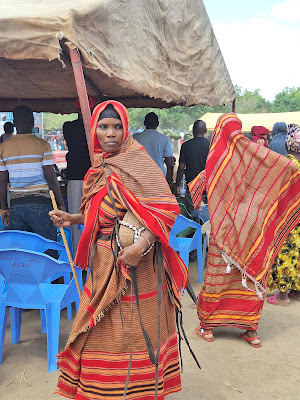The Turkana People and Culture: Pastoralism, Cattle Raiding and Peace.
As a community, the Turkana people rely mainly on Pastoralism which involves keeping livestock as their primary source of livelihood. This livestock also serve economic and cultural purposes as they symbolize economic status and are used in traditional events such as dowry ceremonies. Socio-culturally, pastoralism is a measure of social status in among the Turkanas and it functions as wealth, dowry payment, and settlement of disputes.
 |
| Picture of Turkana pastoralist homestead (Manyatta). |
While this practice is responsible for the survival of the Turkana in a climatically hostile region, it has, over the years, also been characterized by dangers emanating from the conflicts over scarce water and pasture, which are essential in the region. Furthermore, frequent cattle raids between the pastoralist communities in Kenya's Northern region and cross-border communities in South Sudan, Uganda, and Ethiopia also pose a significant risk and often lead to mutual suspicion of neighbouring communities, loss of lives, and destruction of property. This mutual suspicion can also be seen in the way a section of host community members views the refugees as foreign usurpers who are also more favoured by the NGO agencies operating in the area than the locals.
 |
| Picture of a Turkana girl in traditional dressing. |
Cattle raiding is a cultural practice in which the communities like the Turkana engage to restock their herds after periods of drought or disease outbreaks, increase their wealth, and pay dowry. While cattle raiding involved the use of traditional weapons like spears in the past, the pastoral communities have recently adopted smuggled firearms such as AK47s as part of the weapons used to carry out such raids. Having been practised for centuries, the tradition of raiding used to be characterised by manageable violence aimed at the theft of livestock, expanding grazing lands, and accessing new water sources.
 |
| Photo of Turkana Community warriors |
Over time, it has evolved to become an extremely destructive and violent practice due to factors such as the commercialization of the practice, competition over administrative boundaries, attempts to establish or maintain a homogenous electoral base, proliferation of firearms from unstable neighbouring states like South Sudan and Somalia, and land rights disputes. The raids are additionally motivated by impacts of drought and hunger in Turkana County, leading to forced migration of communities as a way of escaping the raids, and disruption of the pastoralist livelihoods which are already at risk due to climate change impacts and economic marginalisation.
 |
| Turkana community warriors meeting. The warriors often conduct cattle raiding. |
As pastoralists depend heavily on the environment for their livestock and domestic demands such as energy, the environmental degradation resulting from hosting large numbers of refugees in enormous and expanding camps has negatively impacted the host community's lives and livelihoods. Additionally, it directly affects the peaceful co-existence between the Turkana hosts and the refugees. A study conducted in Kakuma in 2017 on the causes of tensions between the hosts and the refugees revealed that limited resources and socio-cultural factors are among the leading causes of conflicts between the two groups in Turkana County. Some resources include land, water, and forest, which are in high demand amongst the host community as their pastoralist lifestyle depends on them.
 |
| A section of Kakuma Refugee Camp |


Comments
Post a Comment